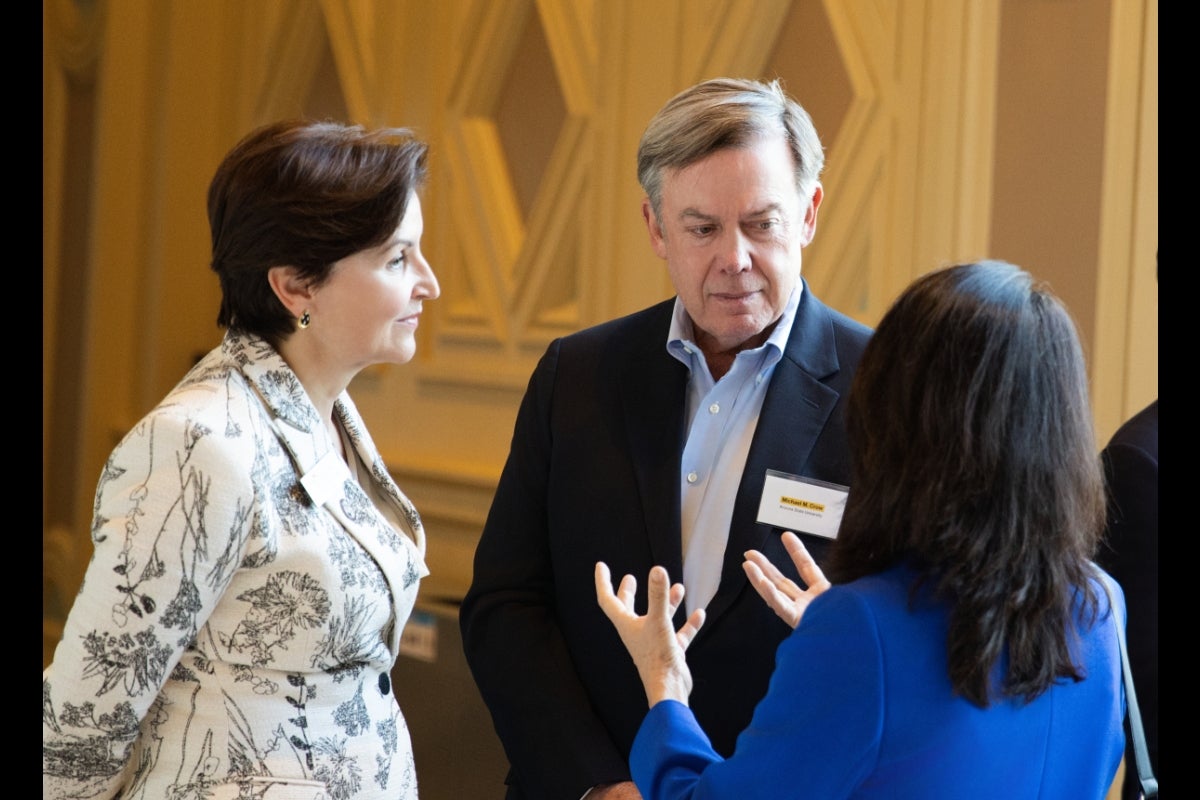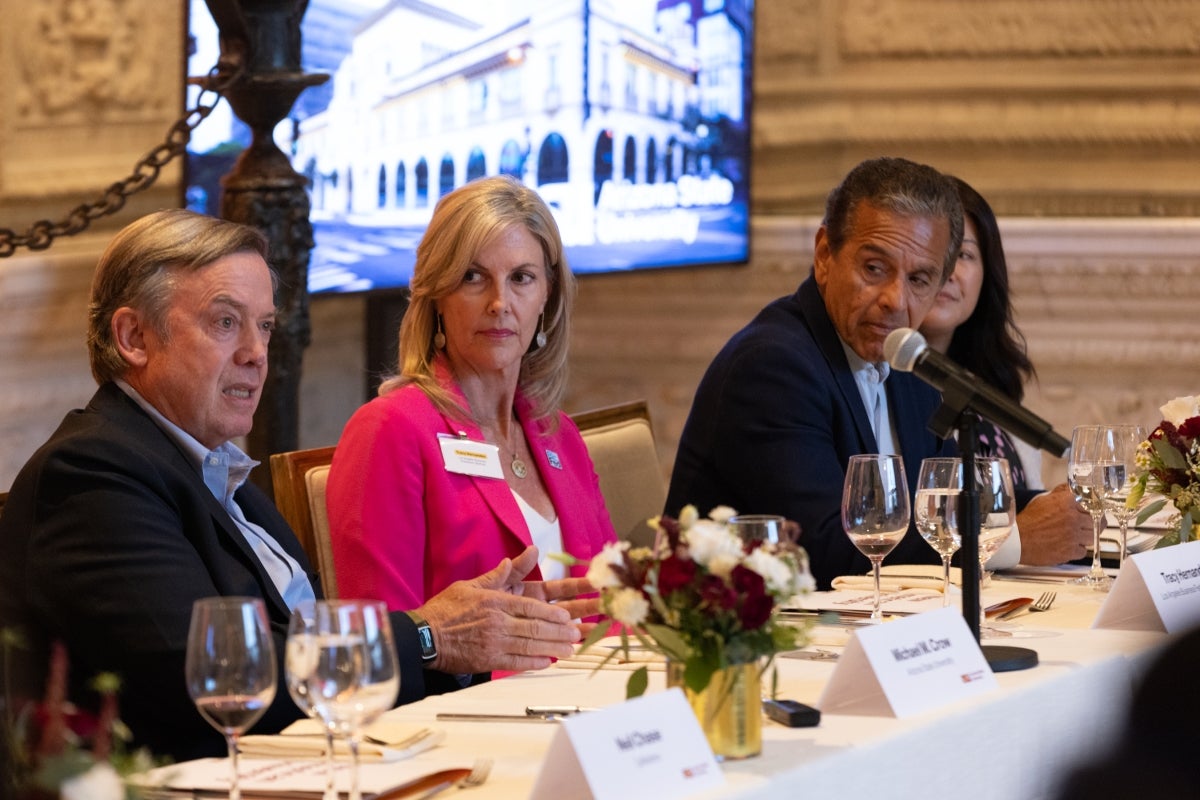Bringing vitality to city centers
ASU special advisor Wellington “Duke” Reiter (center, standing) speaks during the “Reaching New Heights Dinner and Conversation” event, held at the ASU California Center Broadway in Los Angeles on Aug. 26. Attendees, who included numerous university presidents, community and business leaders, and members of the California media, discussed a range of ways that higher education can help meet both city and student needs. Photo by Marty Morris/ASU
Universities, cities and the private sector can jointly tackle workforce development and downtown economic development for the benefit of communities and the people who live in them — all while meeting students’ desires to meaningfully engage in the world.
That was the message as ASU convened a robust conversation Monday at the ASU California Center Broadway, with the ASU-restored Herald Examiner Building serving as a fitting example of adaptive reuse of historic buildings in city centers.
Attendees, who included numerous university presidents, community and business leaders, and members of the California media, discussed a range of ways that higher education can help meet both city and student needs.
President Michael Crow said the gathering shows how ASU engages with partners to challenge the status quo.
“We’ve got to continue the evolution of institutions of higher education in the United States,” he said. “How do we be of greater value to the success of the country? That’s what we’re after.”
ASU’s expansion into downtown Phoenix is a highly successful example nearly 20 years in the making. Key to the success of the campus, said ASU special advisor Wellington “Duke” Reiter, was the decision to fully relocate several whole schools and programs, including the Sandra Day O’Connor College of Law, the Walter Cronkite School of Journalism and Mass Communication, the Thunderbird School of Global Management and the Edson College of Nursing and Health Innovation, among others.
Today ASU is about three-fourths of the way to reaching its goal of 15,000 students at the Downtown Phoenix campus, Reiter said.
Thousands of area residents, jobs, housing units, offices, restaurants, businesses, park spaces and public art are now in downtown Phoenix as a result of the university, city and private investments, leading to what Crow called a “rebuilding of the vibrancy” of the area and the ability for students to fully integrate into the life of the community.
“The city is dynamically transformed from that, and then that led to the beginning of the transformation of other cities,” Crow said.
Today, ASU is similarly and increasingly partnering with the city of Mesa both on the development of the ASU Polytechnic campus and the evolution of downtown Mesa — in addition to its longstanding and expanding partnership with the city of Tempe. And in downtown Los Angeles, ASU operates from the ASU California Center Broadway as well as the ASU California Center Grand, where ASU FIDM is based.
Students are seeking to learn in urban environments where they can become fully enmeshed in a life centered around impact and service to others, as well as around customized, unique experiences they cannot get just anywhere.
Crow said this reality was the impetus for ASU to build a new type of world-class digital creativity center in the form of the ASU MIX Center in downtown Mesa.
Event guests discussed how a successful university presence in a downtown both depends on and leads to desirable dynamics, such as safety, housing, transportation access, nearby employees and supportive businesses. Whereas Manhattan has a proliferation of educational options in its small footprint, downtown Los Angeles — though also a global economic and cultural powerhouse — does not have a similar density of higher education institutions, Crow said.
A shortage of affordable multifamily housing options was identified as one of a few current gaps that must be addressed in order to grow more higher education partnerships in downtown Los Angeles.
Ron Frierson, director of economic development policy of the Western U.S. at Amazon, also discussed the importance of collaborative marketing across higher ed institutions about educational options for learners of all ages within a metro area like Los Angeles. Students are not exclusively young people from California and beyond, he said. LA residents of all ages are reskilling for second- and third-career shifts, and they need to understand what is possible for them to pursue right in their own community.
Much work remains to be done among stakeholders interested in an even more vital downtown, but starting the discussion is important, said Marty Alvarado, a member of the California College of ASU Board of Trustees and a partner in the higher education consulting firm Sova.
“I find it fascinating and refreshing that ASU is here pushing us long-term Angelenos to have these conversations, to actually really think about what is the role of our higher ed ecosystem here in LA, to actually come together and try to revitalize our community,” she said.
For ASU, Crow said it is a calling mandated by the university’s charter and “our commitment to the success of the democracy and the success of the people in it above all other things — including above the success of the university itself.”
Attendees of the gathering included:
Marty Alvarado, partner, Sova
Eric Anderson, executive director of real estate services, California State University, Office of the Chancellor
Alan Arkatov, senior advisor, Arizona State University
Neil Chase, CEO, CalMatters
Michael M. Crow, president, Arizona State University
Ron Frierson, director of economic development policy in the Western U.S., Amazon
Samuel Garrison, senior vice president of university relations, University of Southern California
Adolfo Guzman-Lopez, higher education correspondent, LAist
Tracy Hernandez, founding CEO, Los Angeles Business Federation (BizFed)
James Limbaugh, president, West Los Angeles College
Lucius Martin, deputy mayor of economic development, city of Long Beach
Alfred McQuarters, president, Los Angeles Trade-Technical College
Krista Newkirk, president, University of Redlands
Fabian Nuñez, founder and managing partner, Actum
Anh Nguyen, chief strategy officer, Central City Association of Los Angeles
Lindsay Nyquist, chief of staff, Occidental College
James O’Brien, senior vice president of university affairs and chief of staff, Arizona State University
Wellington “Duke” Reiter, special advisor to the president, Arizona State University; executive director, University City Exchange; founder, Ten Across
Max Reyes, senior director of economic policy, city of Los Angeles
Sandra Sanchez, dean, economic and workforce development, Los Angeles Harbor College
Josh Schimmels, publisher and CEO, Los Angeles Business Journal
Shelli Stockton, director, Community Partnerships and Events, University of Redlands
Dulce Vasquez, assistant vice president, Office of University Affairs, Arizona State University
Teresa Watanabe, staff writer, Los Angeles Times
Hannah Welk, editor-in-chief, Los Angeles Business Journal
Antonio Villaraigosa, infrastructure advisor, state of California
More Local, national and global affairs

Higher education key to US competitiveness, security
ASU President Michael Crow’s notion of universities as public service institutions — places that serve society in practical and meaningful ways to solve pressing issues of importance to the country…

Military program leaders learn about breadth of ASU's defense-focused initiatives
Arizona State University seeks to be the U.S. military’s top partner in strategic learning and innovation. To advance this vision, the Office for Veteran and Military Academic Engagement hosted…

Expert discusses America's place in outer space with ASU students
If you asked Esther Brimmer about what security issue the United States should focus on next, she might say the moon. In fact, that’s exactly what she recently told a student at an event hosted by…



